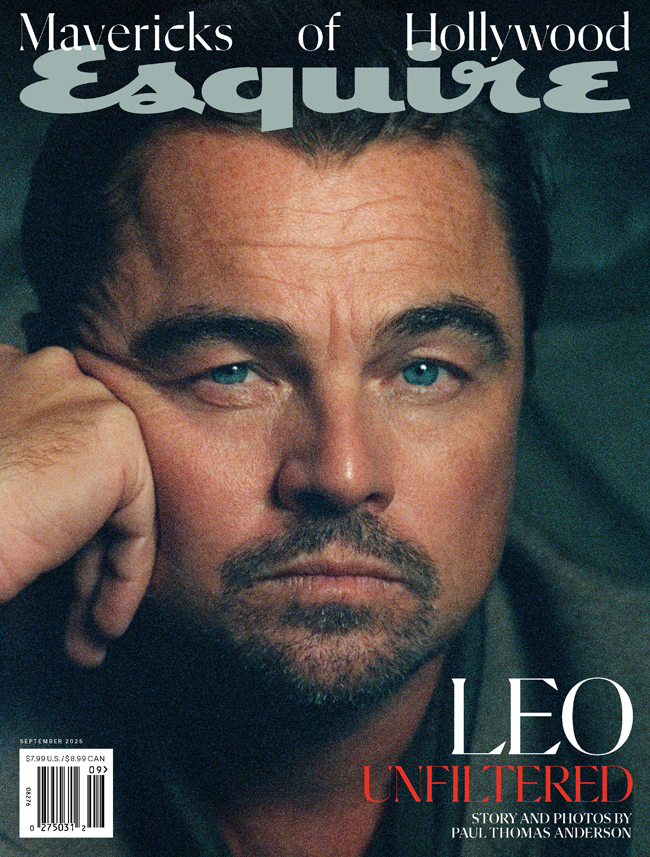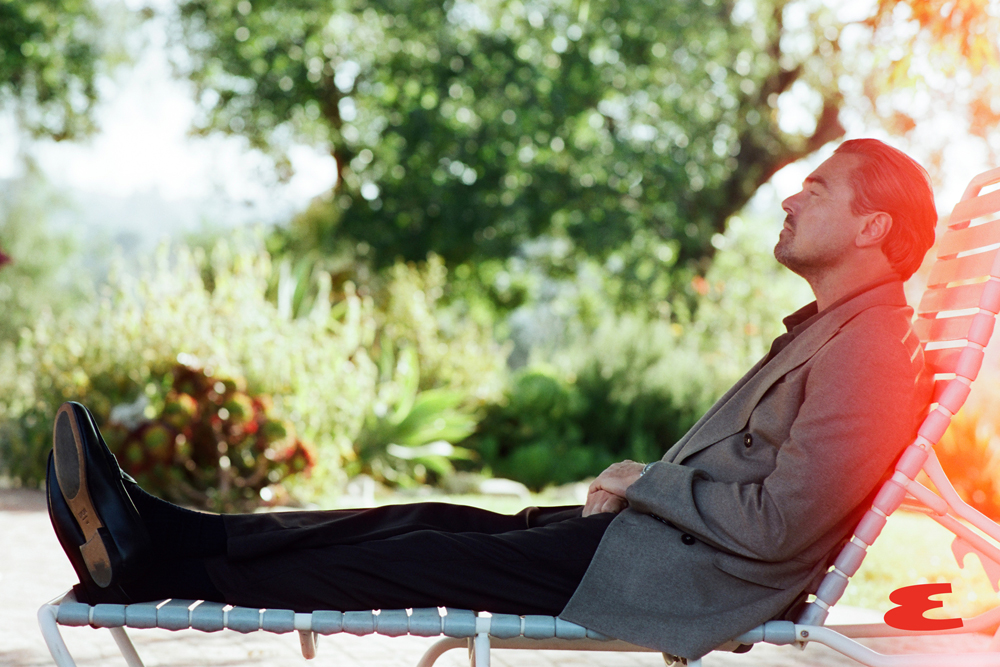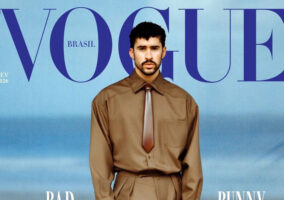
How do you get Leonardo DiCaprio talking? Put him in a room with Paul Thomas Anderson. ONE BATTLE AFTER ANOTHER is Anderson’s first film with DiCaprio. Both men rarely give interviews, and they are on the record together for the first time. This summer, they had two conversations: one in Leo’s kitchen, another over the phone.


On regrets:
Paul Thomas Anderson: Any regrets?
Leonardo DiCaprio: I’ll say it even though you’re here: My biggest regret is not doing Boogie Nights. It was a profound movie of my generation. I can’t imagine anyone but Mark [Wahlberg] in it. When I finally got to see that movie, I just thought it was a masterpiece. It’s ironic that you’re the person asking that question, but it’s true.
On aging:
Anderson: I’m going to ask you a question, and you’re going to answer as quickly as you can. If you didn’t know how old you are, how old are you right now?
DiCaprio: Thirty-two.
Anderson: Here’s a question Esquire wants me to ask. “You turned fifty last year. Does it feel like a natural time for reflection?”
DiCaprio: “You turned emotionally thirty-five last year.”
Anderson: “Your age is fifty, but your emotional maturity is thirty-two.” How does that feel?
DiCaprio: So they’re asking about age?
Anderson: They’re asking if it’s a natural time for reflection.
DiCaprio: Well, it creates a feeling like you have a desire to just be more honest and not waste your time. I can only imagine how the next few decades are going to progress. I look at my mother, for example, and she just says exactly what she thinks and wastes no time. She spends no time trying to fake it.
Anderson: Yeah.
DiCaprio: Being more upfront and risking having things fall apart or risk the disagreements or risk going your separate ways from any type of relationship in life—the personal, professional—it’s that you just don’t want to waste your time anymore. You have to just be much more upfront. It’s almost a responsibility because much more of your life is behind you than it is ahead of you.
Anderson: That’s a good answer.
On being considered an “art-house director”:
DiCaprio: You are considered a very art-house director. Would you call it that? What do you call it?
Anderson: Well, there’s no need to be insulting.
DiCaprio: No, what’s the term? You don’t do incredibly commercial movies, let’s put it that way. You are a writer, director. You have your own vision. What’s the term?
Anderson: Box-office challenged?
DiCaprio: No, you do appreciate big-budget movies, like a Marvel film. I’ve heard you talk about Terminator 2—about going to film school and somebody saying, “If you’re here to make Terminator 2, you’re in the wrong place.” And you said, “Well, f*ck that. Terminator 2 is a f*cking great movie.”
On One Battle After Another as an action film:
DiCaprio: This, to me, is a Paul Thomas Anderson version of an action film. I was like, car chases? How’s Paul going to do French Connection? What is he going to do that we haven’t seen Michael Bay do and make it a Paul thing?
Anderson: Twenty years ago, I started writing this story, and the kernels of it were basically just to write an action car-chase movie. I would go to this story every couple years. Sometimes I thought I would like to adapt Thomas Pynchon’s Vineland, a book written in the eighties about the sixties. But I was looking at it in the early 2000s, thinking of what the story means at that time. Cut to a whole other story that I had floating around that was about a female revolutionary. In other words, for twenty years I’ve had all these various strands, and in a way, none of them ever went out of style, because whatever seems to be happening politically seems to always be the same. Same sh*t, different year.
On the inspiration for One Battle After Another:
DiCaprio: A lot of people say One Battle After Another was based on Vineland. I never read Vineland. You never spoke to me about it. There’s a lot of references to the book, but I since have read it, and I see some of the roots of where this story came from, and the whole idea of what happens to these revolutionaries in their post-sixties life.
Anderson: Vineland was always going to be too hard to adapt, so I stole the parts that spoke to me and just started running like a thief. I guess that’s what all us writers do—we’re f*cking thieves. I always liked the structure of Les Misérables. You have a wild and crazy first act, and then you settle into the story, and you must pick up the pieces of the wreckage or you must reckon with the choices you made in the first act. This is a very good dramatic structure.
On dedicating 20 years to One Battle After Another:
DiCaprio: What was it about this movie that made you want to dedicate twenty years to it?
Anderson: Political films can be like eating your vegetables. There are many exceptions of great films that are political; however, right now the only thing I want to see is a story that I can relate to. And the only thing that matters is the emotional. The emotional comes from the story of a family. It comes from the way we love and hate. When films preach, I stop listening. It’s impossible to keep pace with the state of the world—this is why it’s best to focus on the things that never go out of style. You can figure out what never goes out of style by realizing what in a story is going to be the thing an audience really cares about. Our question is: Can a father find his daughter? Or: What does it mean to be a family?
On One Battle After Another co-star Chase Infiniti:
DiCaprio: Chase [Infiniti] was incredible.
Anderson: Yes, she was.
DiCaprio: We did an extensive audition process, and there was some point at which you said, “This is the one.” And I said, “Yes, this is the one.” And this was her first movie.
Anderson: We started with filming your scenes with her. I remember thinking, I’m really going to keep an eye on her today; she must be very nervous. And she wasn’t nervous—maybe she was, we all probably were. But the point is, she was so instantly a professional. We shot the final scene at the beginning. I think we all collectively said, “This will never be in the
movie. We’re going to go make the movie, and we’ll come back to this; we’re never going to get anything good here.” And lo and behold, I think we got something quite magical.
DiCaprio: That final scene—it’s very, very moving.
On shooting One Battle After Another:
Anderson: I will always remember [shooting in the supermarket] as a great day, when you kept looking around, asking, “Are we going to close this supermarket down?” Me saying, “No, we’re just going to shoot.” And then the cashier at the checkout, in the middle of your scene, takes out her phone and starts taking pictures of you. That made me laugh. I guess she got bored taking pictures after a while.
Anderson: We shot underneath a freeway underpass, forty feet from the border of Tijuana, while we were raiding the immigration camp. I couldn’t tell the real immigrants who were sneaking across the border from the background artists that we’d hired. No one could. I’d watch them walk in the back of a scene and think, Is that a background cross or is that somebody really crossing? And it would be people that were really crossing the border.
On the impact of Midnight Run:
Anderson: If it’s a Saturday and I’m flipping around thinking, What do I want to watch? chances are I’m going to land on something that has some kind of action-adventure element to it. The first thing that pops to my mind is Midnight Run. I’ve been dreaming of trying to make a film as fun as Midnight Run since I first saw it.
DiCaprio: A masterpiece.
Anderson: I saw it three or four times the week it came out. It’s the high-water mark of a great film for a broad audience. Usually we shove an action movie into a section of the room that disallows us from taking it too seriously. There are exceptions, like Mad Max, but for the most part we don’t let our action films cross with our more dramatic stories, as if you can’t have good acting and someone driving a car or shooting a gun. But Midnight Run is the total package.
DiCaprio: I was recently talking about that movie, and a very famous comedian was like, “That may be the greatest f*cking two-man comedy ever done. It’s brilliant.” When my dad was telling me about what acting is, he took me to the theater in Burbank to watch Midnight Run. He said: “You want to be an actor, son? That’s the guy right there—that’s acting.”
On rewatching their films:
Anderson: Do you ever watch any of your old movies?
DiCaprio: I rarely watch any of my films, but if I’m being honest, there’s one that I have watched more than others. It’s The Aviator. That’s simply because it was such a special moment to me. I had worked with Marty [Scorsese] on Gangs of New York, and I’d been toting around a book on Howard Hughes for ten years. I almost did it with Michael Mann, but there was a conflict and I ended up bringing it to Marty. I was thirty. It was the first time as an actor I got to feel implicitly part of the production, rather than just an actor hired to play a role. I felt responsible in a whole new way. I’ve always felt proud and connected to that film as such a key part of my growing up in this industry and taking on a role of a real collaborator for the first time.
Anderson: I can stop and watch it anytime.
On the State of Hollywood:
DiCaprio: What do you make of the state of the movie business today?
Anderson: I’m just trying to rapidly live in reverse to hold on to any shred of the Olden Times that’s left. This is called denial and nostalgia—wish me luck. I’m only half kidding. The irony is that the best part of life is the constant forward momentum. It only moves in one direction, so hop on and hold tight. Every “sky is falling” panic has been screamed and screamed again. Best to remain calm, keep your head down, and dedicate yourself to the work at hand. The rest is just noise. I love our business, and I’ve seen it flourish and eat itself and then turn around and grow strong and then make the same mistakes it made years earlier. Through it all, it’s still standing. Or in other words, “You never got me down, Ray.”
DiCaprio: Raging Bull.
This Esquire cover story, “Leonardo DiCaprio Unfiltered,” is on Esquire.com now and will be in the September “Mavericks of Hollywood” issue, available by August 26 everywhere magazines are sold.
[Photo Credit: Paul Thomas Anderson/Esquire Magazine]
Red Carpet Rundown: THE RAINMAKER New York Premiere Next Post:
STEVE Starring Cillian Murphy and Tracey Ullman | Official Trailer, Poster and Images
Please review our Community Guidelines before posting a comment. Thank you!



